English Words in Action, Group S
(a variety of English words which have developed through history and are currently used in our modern age)
Simply click on this banner (or the following link) and you will be on your way to stimulate your brain for greater word comprehension with quizzes based on some of the words in this unit.
2. A slang reference for people who are considered to be riffraff, trash, or lowest of the low: The officials considered the demonstrators to be the scum of the city.
2. Someone who is considered to be sleazy, dirty, or disreputable; such as, a totally disgusting person who is considered to be rude and derogatory: The youth leader used to be considered a scumbag, but after working in the local youth shelter, he has turned his life around.
The park officials urged the clean-up crew to use rubber gloves when picking up scumbags left under the trees after the riotous rock concert.
Paul had to make a public announcement to restore his reputation if he wanted a chance at winning the election as mayor after his opponent spread scurrilous lies about him.
Scurrilous accusations or stories are untrue and unfair, and they are likely to damage the reputation of the person that they refer to.
2. Relating to something that is said or done unfairly to make people have a bad opinion of a person: Catherine, an actress and a singer, criticized a reporter who spread scurrilous articles about her in his newspaper which were unfounded and unjust.3. Etymology: from Latin scurrilis, "buffoon-like", from scurra, "a vulgar buffoon (a person who does silly things) who behaves in an indecent, vile, or vulgar way".
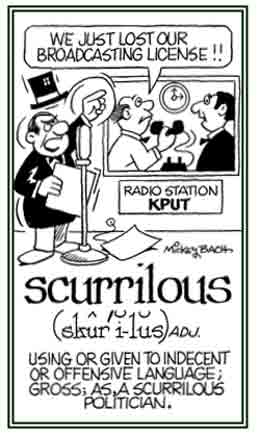
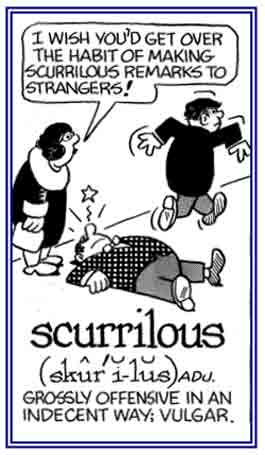
Go to this Word A Day Revisited Index
so you can see more of Mickey Bach's cartoons.
2. Etymology: from Latin scutella, a form of Latin scutra, "a flat tray, a dish".
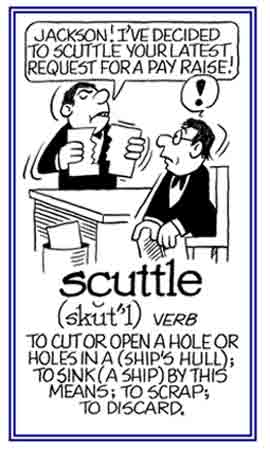
Go to this Word A Day Revisited Index
so you can see more of Mickey Bach's cartoons.
Back in the early 1800s, the cask containing a ship's daily supply of freshwater was called a scuttlebutt; that name was later applied to a drinking fountain on all ships or at naval installations.
2. Etymology: from Middle English scuttel, scutel, "dish, platter" + butt, "a keg of drinking water with a hole cut in it on board ships" because sailors would gather around the scuttlebutt, "to drink and to exchange gossip."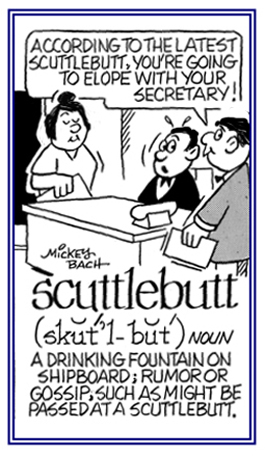
Go to this Word A Day Revisited Index
so you can see more of Mickey Bach's cartoons.
2. Unpleasant or sordid, low, disagreeable: The Lime House District in London, in the time of Charles Dickens, was considered one of the seamier districts in the city.
3. A reference to unpleasant and usually illegal things; such as, crime, drugs, prostitution, etc.: Ted was involved in a seamy corruption scandal.
4. Showing where two pieces of fabric have been joined together: The seamstress was careful to eliminate the seamy appearance of the garment she was making.
5. Etymology: from about 1604, in a figurative sense, "seamy side, least pleasant, worst"; from seam, alluding to the underside of a garment on which the rough edges of the seams are visible and less attractive; and therefore, typically turned in.
2. Etymology: from Middle English sed, "seed"; possibly an allusion to the appearance of flowering plants that had a lot of blossoms which turned into seeds.
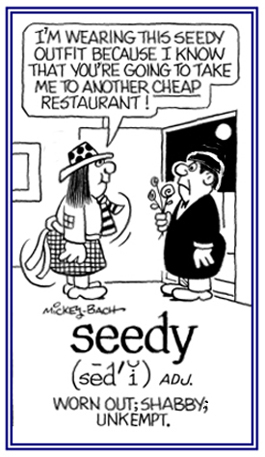
Go to this Word A Day Revisited Index
so you can see more of Mickey Bach's cartoons.
2. Someone who predicts what will happen in the future by using spiritual insight or divination: Cathy decided to go to the seer with the crystal ball in order to see if her dream of becoming a journalist would come true.
Synonyms that express what a seer is include: a forecaster, a predictor, a prognosticator, a presager, and a foreteller.
4. Etymology: from Middle English seen, "to see, to perceive".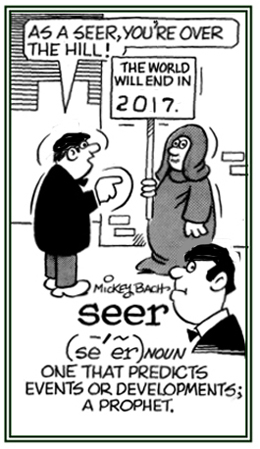
Go to this Word A Day Revisited Index
so you can see more of Mickey Bach's cartoons.
2. To be violently disturbed, against, or excited about something: Tom's children were seething with frustration when their TV wouldn't function during the storm.
3. To be very active: John's brain was seething with ideas about how to improve the contents of his writing project.
The farmer was exasperated when he saw his fields being seethed with millions of grasshoppers.
4. Etymology: from Old English seothan, "boil".2. A person who is provoked, infuriated, or irritated: Dave became a seether who was very disturbed when he had his book about refugees, who were fleeing their countries, rejected by three publishers.
2. Etymology: from Greek seraphim, serapheim and Latin seraphim, seraphin, "highest order of angels".
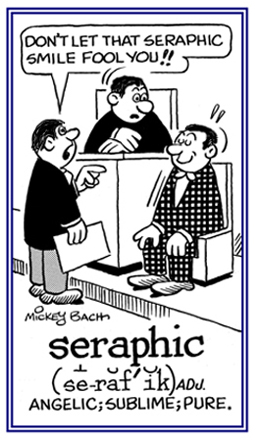
Go to this Word A Day Revisited Index
so you can see more of Mickey Bach's cartoons.
"Seven" is a number which has a mystical significance for many cultures and traditions. The early Christian church listed several things in sevens. One of the most influential of these lists is that of the Seven Deadly Sins, made by Pope Gregory the Great (540 AD to 605 AD).
The medieval theologian Saint Thomas Aquinas discussed these sins in detail in his Summa Theologica, and as a result, he made them widely known.- Anger, wrath, or ire; a feeling of hostility or rage, that can often result violence.
- Avarice, covetousness, or greed; that is, the a dominant desire for material gain.
- Envy, the desire to have what others have, including both material goods and personal attributes.
- Gluttony, consuming too much of something which might be good in moderation. It usually refers to food, but can it can refer to any material goods.
- Lechery, or lust which is the desire for physical, and especially, sexual pleasure.
- Pride or vainglory, a feeling of superiority and an excessive belief in one's own abilities. This is usually considered the worst of the sins.
- Sloth, which refers to spiritual apathy as well as simple laziness.
The list of the Seven Deadly Sins was often contrasted with that of the "Seven Cardinal Virtues"; however, as Thomas Aquinas was careful to explain, they are not direct opposites. In Christian terms, a "deadly" or "capital" sin is one that cuts the sinner off from God and for a believer, this is a fate worse than death, since it is thought to lead to eternal damnation.
In non-Christian terms, these sins may be seen as character faults, which damage a person's spiritual development.
The Seven Deadly Sins are classified as "deadly", not merely because they constitute serious moral offenses, but also because they promote other sins and further immoral behavior; so, the Seven Deadly Sins are also called the deadly "vices", which is considered by some to be more accurate. They are basic, perhaps universal human tendencies, from which other sins result.
2. To move or to have parts of a person's body move in short, quick movements and in such a way as to lose control: Expecting her father to call about her mother's condition, Shanna's hand shook as she reached for the phone.
Links to all of the groups of English words in action, Groups A to Z.
You may see the bibliographic list of sources of information for these words in action.


